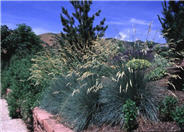
Common name:Blue Oat Grass
Botanical name:Helictotrichon sempervirens
The blue oat grass is a evergreen blue clumping grass that grows 12-18 in. tall and wide. Its showy flowers are 1-2 ft. above the foliage. This plant looks good alone as well as in mass plantings. The blue oat grass likes dry hill sides and is drought tolerant. -Cornflower Farms
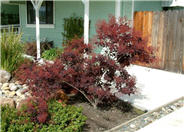
Common name:Purple Smoke Tree
Botanical name:Cotinus coggygria 'Purpureus'
A deciduous shrub or small tree that grows up to 10' tall, the purpureus is grown for its wispy, thread-like flower clusters and outstanding fall color. Its foliage has a redish purple color that turns somewhat green in summer. The plant requires sun to part shade, with little or no summer water. -Monterey Bay Nursery
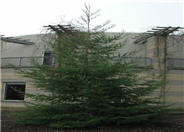
Common name:Coast Redwood
Botanical name:Sequoia sempervirens
This fast-growing, aromatic tree has soft, dark green foliage with long needles appearing in flat sprays and brown, barrel-shaped cones that appear after 1 year. Its soft, red-brown bark is fiberous and furrowed. Particularly after mechanical damage, this tree will stump sprout to form new, young trees around the stump. Avoid planting in areas of high foot traffic.
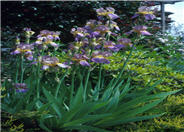
Common name:Bearded Iris
Botanical name:Iris Bearded Hybrids
This perennial will grow 1-3' tall and has medium-size blue/green leaves with wonderful flowers that come in a variety of colors.
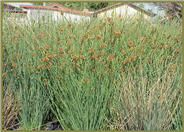
Common name:Quartz Creek Rush
Botanical name:Juncus effusus pac. 'Quartz Creek'
This selection of a vibrant green reed is widely used in landscapes due to its carefree nature and rigid upright structure. This Juncus initially grows very rapidily and then slows to eventually clump to 36" wide. It will reach a height of approximately 24-36". Reguires fairly regular water in the warmer months to perform well. Requires wet soils and lots of water. Use only in high water areas.
| Designer: 2660 E Lake Ave., Watsonville | Sculpture in Motion |
Photographer: GardenSoft |
Soils and Compost:
Incorporate compost 6" into your soil to retain water, reduce compaction, feed earthworms, and provide valuable nutrients to your plants.
Water Saving Tip:
Eliminate runoff, especially with fixed spray sprinklers, clay soils, and slopes, by dividing the total watering time into shorter increments.
This allows water to soak in.
Integrated Pest Management:
Drip and other smart irrigation delivers water directly to roots, allowing no excess water for weeds.

